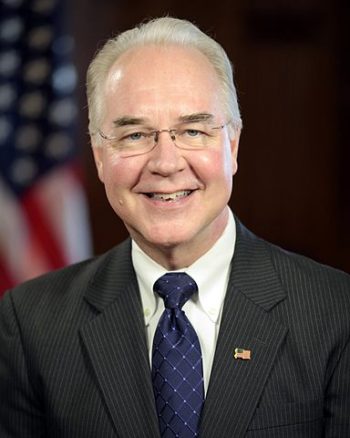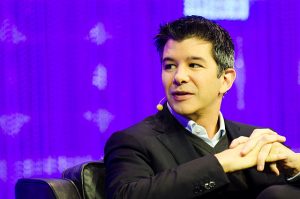By Peter Ward February 3, 2017
Price’s Conflicts Discrepancy

Tom price, health and human services secretary nominee, has conflicts. ©By Office of the President-elect
Health and Human Services Secretary nominee Tom Price was given a privileged offer to buy stock in a biomedical company at a discount in 2016, contrary to his congressional testimony this month.
James V. Grimaldi writes in The Wall Street Journal that officials of Innate Immunotherapeutics, an Australian medical biotechnology company, have revealed that Tom Price was one of fewer than 20 U.S. investors who were invited to buy discounted shares in the company last year.
In Price’s Senate confirmation hearings on January 18 and 24, he asserted that the shares he bought “were available to every single individual that was an investor at the time.”
Price’s was invited to invest in the company by a company director and fellow congressman, according to Grimaldi’s report. The shares were discounted 12% off the traded price in mid-June, only for investors who participated in a private placement specifically to raise money for a clinical trial. Since then, the company’s shares have tripled.
“The details of Mr. Price’s share purchase have drawn questions during his congressional hearings because they could indicate whether he received preferential treatment based on a congressional connection and wasn’t the average investor he has portrayed himself to be,” Grimaldi writes.
Price has previously said that he has done nothing wrong and has disclosed all his trades.
Uber’s Terrible Week

Uber CEO Travis Kalanick announced plans this week to step down from President Trump’s business council. ©By Heisenberg Media – Flickr: Travis Kalanick LeWeb Day 1, CC BY 2.0
The fight for the ride-hailing market took another twist this week, after a social media campaign urged users to delete Uber amid claims it broke a strike in New York on the weekend, Julia Carrie-Wong explains in The Guardian.
The #DeleteUber hashtag was trending on Twitter and Facebook as users expressed outrage that the company was apparently open to working with Donald Trump-Uber’s CEO Travis Kalanick was, until this week, on his business council-and sending cars to JFK during the hour when taxi drivers launched a strike protesting Trump’s anti-Muslim executive order.
Over at Uber’s biggest rival in the U.S. Lyft, co-founders Logan Green and John Zimmer announced a $1 million donation to the American Civil Liberties Union to “defend our constitution.”
“Banning people of a particular faith or creed, race or identity, sexuality or ethnicity, from entering the U.S. is antithetical to both Lyft’s and our nation’s core values. We stand firmly against these actions, and will not be silent on issues that threaten the values of our community,” the co-founders wrote in a blog post.
By Monday, Lyft was the fourth-most-downloaded free app on Apple’s App Store, ahead of Uber at number 13. It was also reported that Uber built an automated system to deal with the huge number of people requesting to deactivate their accounts. Uber’s Kalanick also announced he would step down from Trump’s business council.
Affordable Care Act Popularity Rises

Doctor visit ©Laura Smith
Donald Trump has made repealing the Affordable Care Act one of his top priorities – but Obamacare has more support than ever. The wholesale repeal would upend the healthcare sector and, given that no replacement is ready, could devastate the lives of many Americans.
This week Republican lawmakers said there isn’t a “mega-bill” in the works that could repeal Obamacare in one swoop, but they are planning to dismantle the law piece by piece. That may not please Trump, who seems intent on obliterating Obamacare even before an alternative is in place.
Using extensive polling data, New York Times reporters Margot Sanger-Katz and Haeyoun Park show that more Americans approve of the Affordable Care Act than did just over a year ago, and those who support ACA outnumber those who oppose it.
An NBC/Wall Street Journal poll showed that 45% of American thought the Affordable Care Act was a good idea at the start of this year, compared to 41% who thought it was a bad idea. A Fox News poll also showed a reversal in attitudes. In August 2015, 41% of people polled were favorable to Obamacare, and 54% were unfavorable. In January 2017 those numbers had shifted to 50% favorable and 46% unfavorable.
“There is a shifting public focus away from what is wrong with the Affordable Care Act to a world where 21 million people could lose coverage,” said Robert Blendon, a professor of health policy and political analysis at Harvard. “The Affordable Care Act may not be more popular, but the implications of repeal are shifting people to a less negative stand on the law.”
Tech’s Trump Problem

Stewart Butterfield, CEO of workplace app Slack, who offered to match employee donations to ACLU this week. ©kris krüg
Of all the business sectors affected negatively by Donald Trump’s anti-immigration actions, the technology industry will arguably be hit worst.
Silicon Valley companies rely heavily on skilled immigrants to fill thousands of jobs, and have voiced strong opposition against Trump’s recent executive order ban on refugees and immigrants from certain countries. Several companies and their CEOs have donated money to the American Civil Liberties Union (ACLU) and other organizations looking to either fight the ban or help those affected by it.
Amazon and Expedia filed declarations of support on Monday for Washington state’s lawsuit against Trump’s executive order. Stewart Butterfield, CEO of the workplace app Slack, and Chris Sacca, an investor at Lowercase Capital, both agreed to match any individual donation to the ACLU earlier this week, if people sent proof of their donation to them via Twitter. Microsoft employees were also encouraging each other to take advantage of a reported offer by the company to match their donations to the ACLU.
Meanwhile, USA Today reports that Google has created a $2 million crisis fund that can be matched by employees for a total of $4 million. That fund will support the ACLU, Immigrant Legal Resource Center, International Rescue Committee, and UNHCR.
In fact, the ACLU has received so much money in donations in the days since Trump’s Jan. 28 immigration order was announced that it has turned to Y Combinator, an incubator of startup companies, to help turn that money into growth and progress. As of January 31, the ACLU had raised $24 million.
The Week’s Top Headlines
Facebook beats in Q4 with $8.81B revenue, slower growth to 1.86B users – Josh Constine, Techcrunch
Fed leaves interest rates unchanged, remains upbeat on economy – Lindsay Dunsmuir, Jason Lange, Reuters
With a new $1.5 billion airport hub, Amazon is closer to having its own parallel transport infrastructure – Leslie Josephs, Quartz
Apple beats on revenue and profit but forecasts weakness – Kif Leswing, Business Insider
VW and Bosch propose deals to settle US diesel claims – BBC
Ralph Lauren CEO Leaving After Creative Clash With Founder – Stephanie Hoi-Nga Wong, Bloomberg News
Sony Says It Won’t Sell Movie Unit Despite Nearly $1 Billion Write-Down – Takashi Mochizuki, The Wall Street Journal
Google Dethrones Apple as Most Valuable Brand – Rhonda Schaffler, The Street
Deutsche Boerse chief executive in insider trading probe –BBC
Janet Yellen: first female Fed chair and economics trailblazer faces Trump’s ax – Jana Kasperkevic, The Guardian
This entry was posted on Friday, February 3rd, 2017 at 6:11 pm. It is filed under Week in Review. You can follow any responses to this entry through the RSS 2.0 feed.
Comments are closed.
